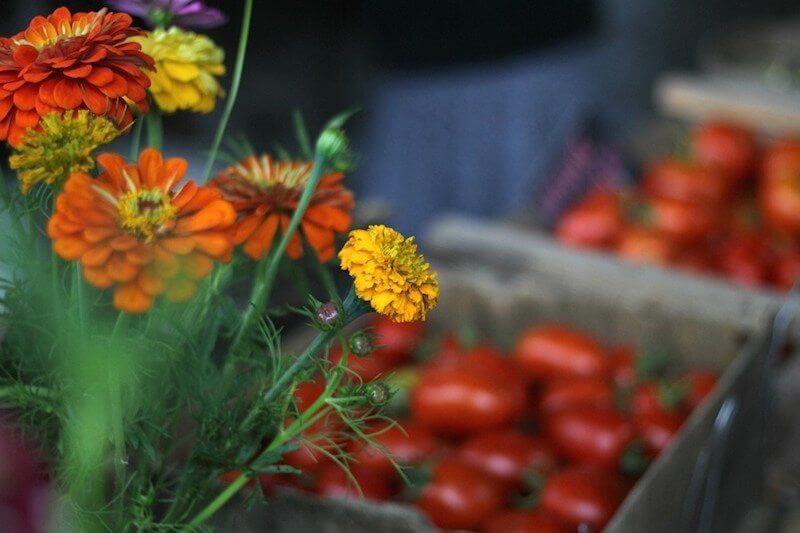Even on a rainy Saturday, a trip to the Nashville Farmers’ Market is sure to ignite your senses. A heavy downpour doesn’t begin to drown out the clamor of curious shoppers, educated farmers and regular restaurant-goers looking to start their morning with a butter cake or stack of pancakes. On this particular soggy morning when we visited, the market was populated mostly by people with a purpose: looking for what they needed to make dinner.
Inside the farm sheds, produce stands are fresh and full of color with produce picked daily. In peak season, the market becomes a labyrinth of berries, tomatoes, corn and peaches. The scent of ripe cantaloupe mixes with that of donuts from the fryer and just-popped popcorn. I always make a beeline for Swafford Farm‘s booth in search of what are not only the best tomatoes in Tennessee, but arguably the best in the world. Much to my surprise, there are still plenty left at 9:30 a.m. on Saturday morning.

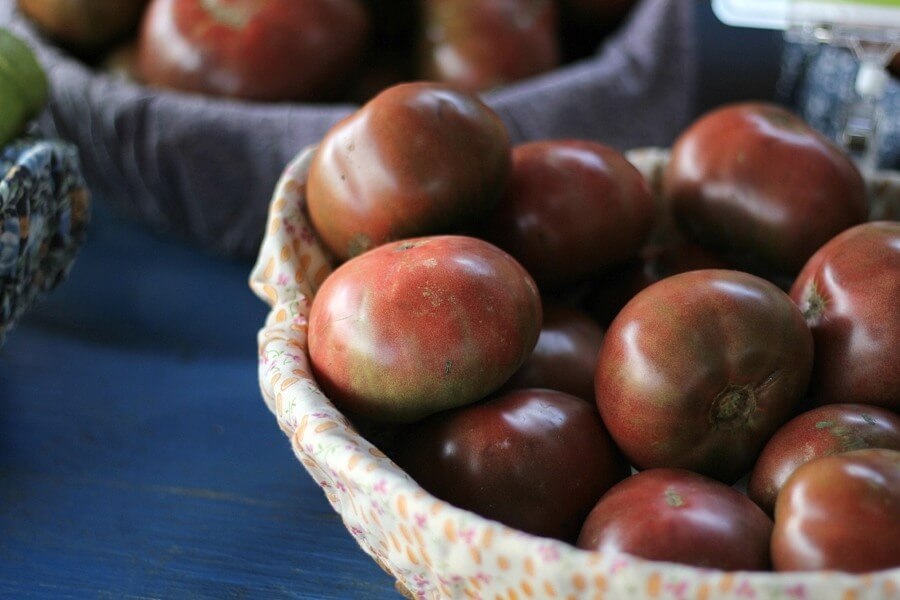
Farm Sheds
Swafford Farm sets up shop at the far end of the sheds, near the entrance to Gardens of Babylon, every day from May through October. The farm, located in Pikeville, Tennessee, dedicates 125 acres to homegrown tomatoes. Seasonal strawberries, peppers (sweet and spicy) and fall pumpkins and gourds are almost as popular as their tomatoes. Swafford is one of 40+ farms represented at the market regularly, although only seven stay open every day. Some folks (guilty) have a system that takes them from one vendor to the next, securing the necessary items before allowing themselves to stroll the market. Even seasoned veterans soak in the smells and sounds as they meander through the crowd without a designated target, ready to discover something delicious.
Early in 2015, the market implemented a major policy change to become a farmer-and-producer-only market, saying goodbye to re-sold agriculture and goods. “People expect to find farmers at their farmers’ market, and we are glad to say you will always find a farmer here,” says Nashville Farmers’ Market Executive Director Tasha Kennard. “We moved to a producer-only model, but not a local-only model. Products in the sheds can be from anywhere, but the producer — who is growing, making or baking the goods — must be here.”
There are two distinct seasons in the farm sheds: May through mid-November (peak season) and mid-November through April. The winter market transitions from a daily market to a weekend market. During these months, you are likely to find winter greens, squash, sweet potatoes, maple syrup and mushrooms. On Saturdays during the winter market, you will find about 40 vendors — compared to the 80-100 vendors during peak season.


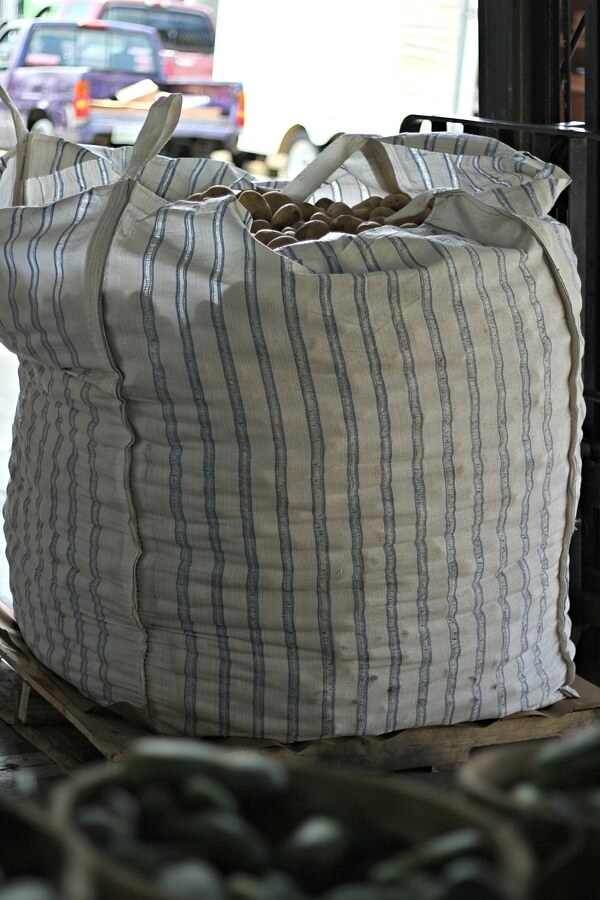

“Some merchants have been here for 15-20 years, while some are new. We have worked hard to create a culture in which the farmers trust and work with one another,” Tasha tells us. There is a community within the farm sheds that is felt by each shopper, me included. While Laura Bigbee-Fott, owner of Whites Creek Flower Farm, rings up a bundle of fresh flowers, noteworthy for the pale purple lisianthus, I spy her next-door neighbor taking a mid-morning snooze. As I snap his picture, she is quick to explain what a helping hand he is each week. As a one-woman show, Laura welcomes the hand he lends in setting up booths and carting produce. This is the community Tasha is describing.
“We have created a strong community that supports the farmers’ market — both in Middle Tennessee and beyond. We have shoppers from Alabama, Georgia and Kentucky on a weekly basis. We have rooted ourselves in the community while creating a strong community internally,” Tasha explains. “Market shoppers visit by the thousands on Saturday and Sunday. These are folks looking for food that is grown locally or regionally and support local and regional agriculture. We get about 10,000 customers in the sheds on the weekend; in 2014 this number was around 4,000-4,500.”
If you choose to be one of those 10,000 customers (and we suggest you do), our best tip for gaining the most from your trip to the market is to ask questions. “If you are looking for something and don’t know how to pick out the products, the farmers will tell you. They will tell you how to shuck corn or bake beans. They will help you discover new cuts of meat and explain how to cook them. Ask questions, and you will walk away more satisfied and have more confidence,” Tasha encourages.
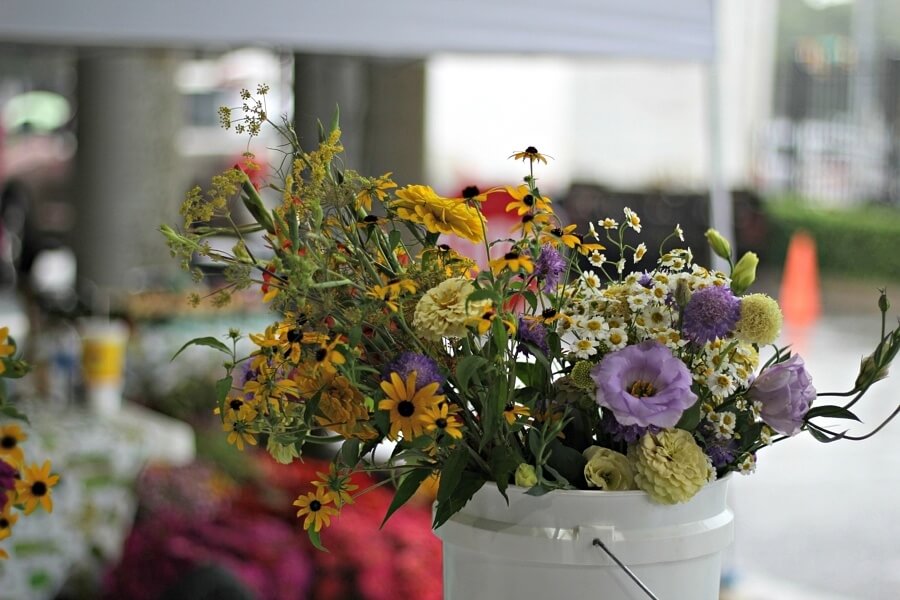




The Nashville Farmers’ Market has a long history that begins in the early 1800s. It has since been in several locations, moving to the current space, at the edge of Germantown adjacent to the Nashville Sounds’ stadium, in 1995. The market occupies 16 acres of urban land. In the last three-and-a-half years, Tasha and her team have been in the trenches of fixing up the facility and are undergoing major renovations to their loading dock and waster center. With the Tennessee State Museum opening next door in the fall of 2018, the Farmers’ Market will turn their loading dock, which is to share a parking lot with the museum, into a grand entrance. Expect to see construction starting in early 2018.
“The biggest challenge — and the biggest opportunity — for the market is the evolution of the neighborhood. Merchants are right in the middle of this economic explosion and benefit. We face issues, such as parking, as more people and businesses move to the community, but we are finding a way to work within that,” Tasha shares.
Additionally, the market (currently a heavy user of styrofoam) is adopting a zero-waste initiative. “We should be the biggest champion for sustainability in our community, and we want to demonstrate our commitment by moving to compostable and recyclable materials,” Tasha explains. Plans in place will reduce overall waste, and the market will be zero-waste by 2020.




Market House Restaurants & Shops
The United States has not only seen a resurgence in the popularity of farmers’ markets, but also in food halls. A reprieve from the rain (and usually the heat), the Market House is a food hall-style space that is home to more than 30 restaurants and shops. “Many are immigrant-owned small businesses; they have grit, tenacity and drive and are wonderful to work with,” Tasha shares. Seven days a week, the Market House begins to fill up around 11:30 a.m. and stays at capacity until 2-2:30 p.m. It is the diversity in the selection that keeps folks coming back.
Take the international options, for example. Bowl and Roil offers bimimbap and Korean-style sushi; Chicago Gyro serves delicious plates of Middle Eastern fare; El Burrito Mexicano gives the treat of Mexican food for breakfast and lunch; Jamaicaway has a strong following for their delicious Jamaican food; and Swagruha introduces many to Indian classics and unique Southern Indian cuisine. You can even shop a selection of Asian, South Asian, Middle Eastern and Mediterranean foods at the International Market. “You are sure to find things you have never tried before,” Tasha tells us. “I had my first gyro here — I fell in love with Mediterranean Greek food. People get to the Market and do the same thing.”
More traditional options come in the form of pizzas and seasonal salads from Bella Nashville, grits and barbecue from B&C Market BBQ, coffee and breakfast pastries from ButterCake Babe’s, grill items from Farmers Deli & Grille, sweet and savory crepes from Music City Crepes, ice cream (or a root beer float) from Jeni’s, craft beer at The Picnic Tap and sandwiches and wine from Natchez Hills.
“The Market offers a relatively inexpensive lunch, and everyone can leave happy — whether you are on a juice cleanse or are looking for pizza. We really shoot the gamut here and offer the opportunity to explore new and different foods. People are often pleasantly surprised to see the Market House and food hall. We want to keep evolving and innovating to continue to surprise the customer,” Tasha shares.
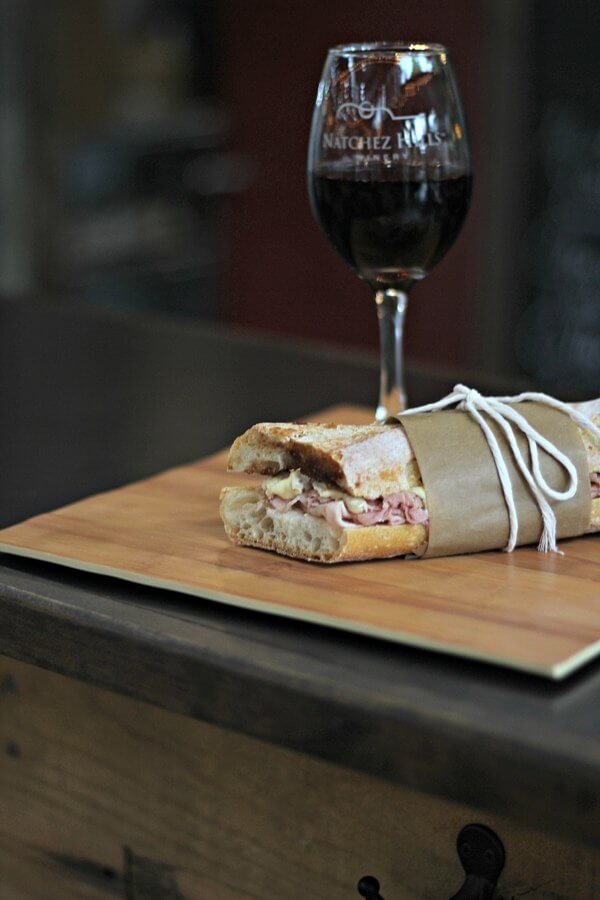
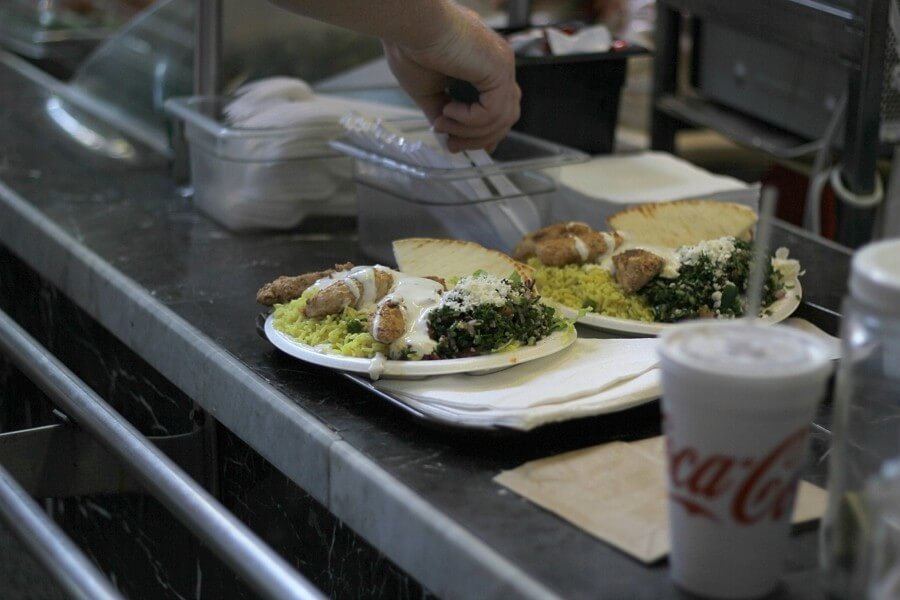

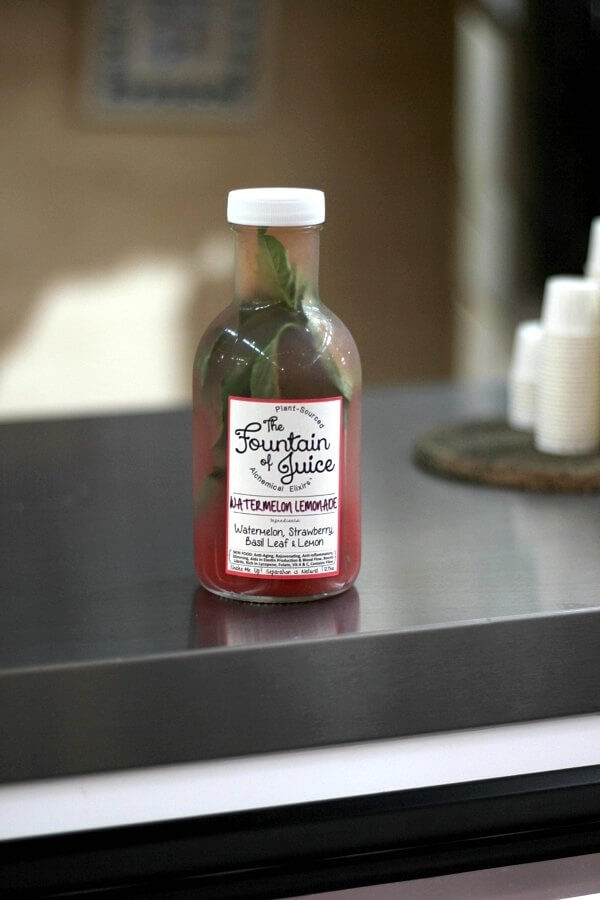



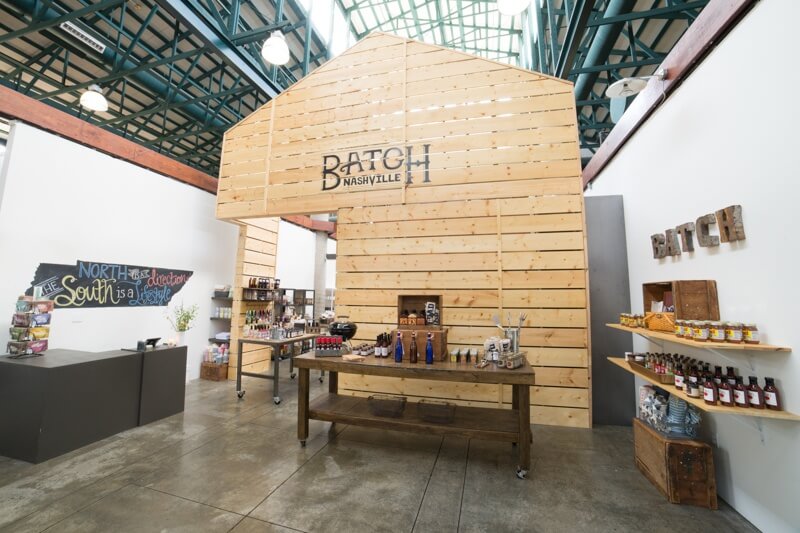
We truly believe that a day spent at the market is a day well spent. Stroll the sheds to explore the offerings, take home enough produce to feed an army or grab lunch at one of the Market House restaurants — or do all three.
Additionally, the market hosts four festivals each year: May Strawberry Jubilee the first weekend of May, Community Farm Day in July, Pepper Fest the second weekend in September, and the Turnip Green Festival in November. Additionally, there are monthly Night Markets held the third Friday of every month that feature 40 vendors in the shed, food trucks, restaurant offerings and live entertainment — perfect for a family activity or even date night.
The Nashville Farmers’ Market is located at 900 Rosa L. Parks Blvd., Nashville, TN 37208. It’s open every day; merchant hours vary.
*******
Find a guide to all local farmers’ markets here!



















